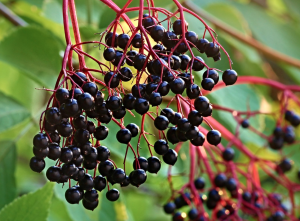 Fläderbär har använts traditionellt inom folkmedicin mot hosta och infektioner. Fläderbären innehåller ämnen som kan hjälpa till att motverka virus och stärka immunförsvaret. De är dessutom rika på C-vitamin.
Fläderbär har använts traditionellt inom folkmedicin mot hosta och infektioner. Fläderbären innehåller ämnen som kan hjälpa till att motverka virus och stärka immunförsvaret. De är dessutom rika på C-vitamin.
Studier i labb styrker att fläder har en virushämmande effekt. En studie visar att fläderbärsextrakt kan förkorta influensa med flera dagar, och enligt en kinesisk studie kan bärextraktet lindra de första influensasymtomen.
Förutom mot infektioner så kan fläderns blommor och bär hjälpa mot förstoppning, framförallt fläderbären en laxerande effekt. Bladen användes förr för att lindra klåda. Fläderblommorna anses dessutom vara urin- och svettdrivande. Förr bryggde man te på blommorna och teet verkade svettdrivande vid t.ex. förkylningar och feber. Både blommor och bär är slemlösande och kan hjälpa vid hosta.
Tänk på att fläderbär inte bör ätas råa eller användas omogna. Koka de mogna bären 15-20 minuter. Både bär och blommor kan torkas och användas till örtte.
Mer vi taggen örter https://4health.se/tag/orter

 Frågan är om inte stress är viktigare än kosten när det gäller utvecklandet av SIBO / IBS? En studie på möss visar t.ex. att stress förändrade tarmfloran på ungefär samma sätt som en dålig kost. “stress caused the gut microbiota of lean mice to more closely resemble that of obese mice.”
Frågan är om inte stress är viktigare än kosten när det gäller utvecklandet av SIBO / IBS? En studie på möss visar t.ex. att stress förändrade tarmfloran på ungefär samma sätt som en dålig kost. “stress caused the gut microbiota of lean mice to more closely resemble that of obese mice.” Vad händer i kroppen när du sitter på kontoret eller i tv-soffan en stor del av dagen? Idag pratar vi med hälsoprofilen Leila Söderholm om stillasittandet, och hur du enkelt kan undvika de farliga effekterna av det.
Vad händer i kroppen när du sitter på kontoret eller i tv-soffan en stor del av dagen? Idag pratar vi med hälsoprofilen Leila Söderholm om stillasittandet, och hur du enkelt kan undvika de farliga effekterna av det. I det nya podcastavsnitt som kommer imorgon, avsnitt 213, kommer populära Leila Söderholm och jag att prata om det farliga stillasittandet och vad som faktiskt händer i kroppen. Leila ger massor med tips på hur du “smygtränar” för att undvika stillasittandet. Du kan aktivera dina muskler på olika smarta sätt när du kör bil, sitter på möte, tittar på tv osv. Missa inte att lyssna! Njut så länge av tipsen på bilderna här! 🙂
I det nya podcastavsnitt som kommer imorgon, avsnitt 213, kommer populära Leila Söderholm och jag att prata om det farliga stillasittandet och vad som faktiskt händer i kroppen. Leila ger massor med tips på hur du “smygtränar” för att undvika stillasittandet. Du kan aktivera dina muskler på olika smarta sätt när du kör bil, sitter på möte, tittar på tv osv. Missa inte att lyssna! Njut så länge av tipsen på bilderna här! 🙂

 Populärast i februari: D-vitamintillskott – bra eller skadligt?
Populärast i februari: D-vitamintillskott – bra eller skadligt?
Senaste kommentarer